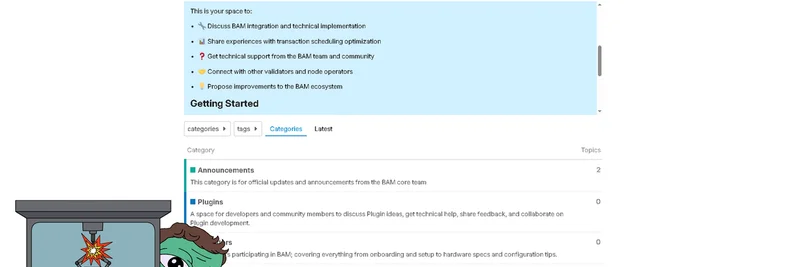Hey there, blockchain enthusiasts! If you're deep into the world of meme tokens on Solana or just keeping tabs on the latest tech advancements, you've probably heard the buzz around Application Controlled Execution, or ACE for short. It's a game-changer for how transactions are ordered in decentralized apps, especially in high-stakes areas like perpetual futures (perps) trading. Recently, Uri Klarman, CEO of bloXroute, dropped a insightful thread on X breaking down three ways Solana could tackle ACE. Let's unpack it in a way that's easy to follow, even if you're not a full-time dev.
The thread kicks off by quoting a post from Jito Labs announcing the launch of their BAM Community Forum. BAM stands for Block Auction Mechanism, and it's Jito's take on improving transaction scheduling. The forum is a hub for discussions on plugins, integrations, and more. Here's a peek at what their forum looks like:
Klarman explains ACE simply: it's about letting each app control the order of its transactions. For example, in perp trading, market makers' transactions land first, followed by takers. This is how Hyperliquid keeps spreads tight—market makers don't get sniped as easily when prices shift, so they can quote more aggressively without extra protection.
Why does this matter for Solana? Well, Solana is decentralized, unlike some competitors, so it can't just dictate order to validators. But perps are booming, and Solana wants a piece of that action. Devs have been chatting about solutions for months, and ACE is the hot topic.
Option 1: The BAM Plugin Approach
Jito was quick off the mark with their BAM solution. Here's the gist:
- Validators stop processing transactions directly from the network.
- They only accept bundles from BAM nodes, which run in trusted execution environments (TEEs).
- Apps create "order plugins" that dictate transaction priority.
- The TEE ensures transactions are ordered as per the plugins.
- Validators must stick to BAM transactions or risk getting banned.
It's a structured way to enforce order, but it relies on Jito approving which plugins get added.
Option 2: Going Permissionless
Klarman points out a potential downside to BAM: it's gatekept by Jito. Want to test a new DEX feature? You'd need their nod to add your plugin. Instead, he suggests a permissionless alternative that builds on Jito's "jitodontfront" idea (a signal to avoid sandwich attacks).
Apps could create priority accounts, like phoenix_prio_1_xxx for oracles, prio_2 for post-only makers, and so on. Transactions would read-lock these accounts, and the protocol reverts any that don't follow suit. Leaders (validators) decide ordering but drop invalid transactions. Apps pool user fees to reward compliant validators and ban rogues.
This way, no central approval needed—apps signal priorities directly through their transactions. It achieves similar results to BAM without the gatekeeping, and malicious actors can't interfere because apps only read their own priority accounts.
Option 3: Maybe Don't Do Full ACE?
Even if permissionless ACE is possible, Klarman questions if it's worth the tradeoffs. We're not getting it for free—it adds complexity, like validators ignoring network transactions. Proprietary AMMs (automated market makers) are already getting tight spreads on Solana. The real issue might be ensuring validators follow fee-per-compute-unit ordering.
Perhaps focusing on that gives 80-90% of the benefits without overcomplicating things. It's a call to explore before diving headfirst into full ACE.
This thread (original on X) is a must-read for anyone building or trading on Solana, including meme token creators who rely on fast, fair execution. As the ecosystem evolves, innovations like ACE could make Solana even more attractive for DeFi and beyond. What do you think—BAM, permissionless, or hold off? Drop your thoughts in the comments!
Stay tuned to Meme Insider for more breakdowns on blockchain tech that powers your favorite memes.


